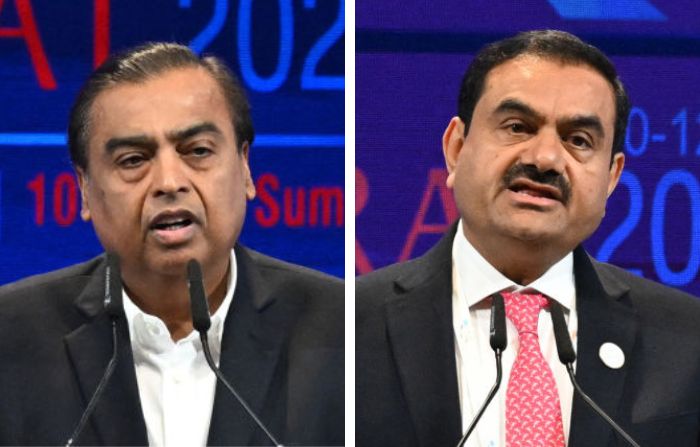- Saturday, July 27, 2024
According to separate stock exchange filings by the two companies, Reliance will acquire 50 million equity shares in Mahan Energen Ltd, a wholly owned subsidiary of Adani Power Ltd.

By: Shubham Ghosh
IN a landmark collaboration between rival Indian billionaires, Mukesh Ambani’s Reliance Industries has acquired a 26 per cent stake in a power project belonging to Gautam Adani in the central state of Madhya Pradesh. Additionally, they have entered into an agreement to utilize the plants’ 500 MW of electricity for captive use.
According to separate stock exchange filings by the two companies, Reliance will acquire 50 million equity shares in Mahan Energen Ltd, a wholly owned subsidiary of Adani Power Ltd, with a face value of Rs 10 (£0.095) at par (equivalent to Rs 50 crore or £4.7 million).
Furthermore, Reliance will utilize 500 MW of generation capacity for captive use, as per the agreement.
Read: Ambani’s Reliance eyes over £2b investment in West Bengal over 3 years
Both the businessmen hailing from the western state of Gujarat have often been pitted by media and commentators against each other but they have for years tiptoed around each other to reach the top two rungs of Asia’s wealth ladder.
With Ambani’s interests spanning oil and gas to retail and telecom and Adani’s focus on infrastructure spanning sea ports to airports, coal and mining, they rarely crossed each other’s path except in the clean energy business where the two have announced multi-billion investments.
Read: US probing bribery charges against India’s Adani Group, Gautam Adani? Not aware, says firm
Adani aspires to be the world’s largest renewable energy producer by 2030 while Reliance is building four gigafactories at Jamnagar in Gujarat — one each for solar panels, batteries, green hydrogen, and fuel cells. Adani is also building three giga factories for manufacturing solar modules, wind turbines and hydrogen electrolysers.
A clash was also forecast when Adani group applied to participate in an auction of spectrum or airwaves capable of carrying fifth generation (5G) data and voice services.
However, unlike Ambani, Adani bought 400 MHz spectrum in the 26 GHz band, which is not for public networks. On the contrary, the two have been far from rivals.
In 2022, a firm with erstwhile links to Ambani sold its stake in news broadcaster NDTV to Adani, paving the way for the takeover.
Adani was also present at pre-wedding celebrations of Ambani’s youngest son, Anant, at Jamnagar earlier this month.
“Mahan Energen Ltd (MEL), wholly owned subsidiary of Adani Power Ltd (APL), has entered into a 20-year long-term power purchase agreement (PPA) for 500 MW with Reliance Industries Ltd (RIL), under the captive user policy as defined under the Electricity Rules, 2005,” Adani Power said in the filing.
One unit of 600 MW capacity of MEL’s Mahan thermal power plant, out of its aggregate operating and upcoming capacity of 2,800 MW, will be designated as the captive unit for this purpose.
A generating plant declared as a captive generating plant (CGP) is required to abide by the rules that state that the captive user(s) consuming the power generated from the captive generating plant for self-use must necessarily hold not less than 26 per cent of the ownership in the captive generating company.
“In order to avail the benefit of this policy, RIL has to hold a 26 per cent ownership stake in the captive unit in proportion to the total capacity of the power plant. It will accordingly invest in five crore equity shares of MEL, aggregating to Rs 50 crore for the proportionate ownership stake,” the filing said.
“This development brings between two corporates an exclusive arrangement for 500 MW of power purchase by Reliance Industries on a long-term basis.” It is unclear where Reliance intends to use the MEL power. It already has captive units at mega oil refining and petrochemical complexes in Gujarat and Maharashtra and its coal-bed methane (CBM) extractions in Sohagpur in Madhya Pradesh may not need 500 MW of electricity.
(With PTI inputs)